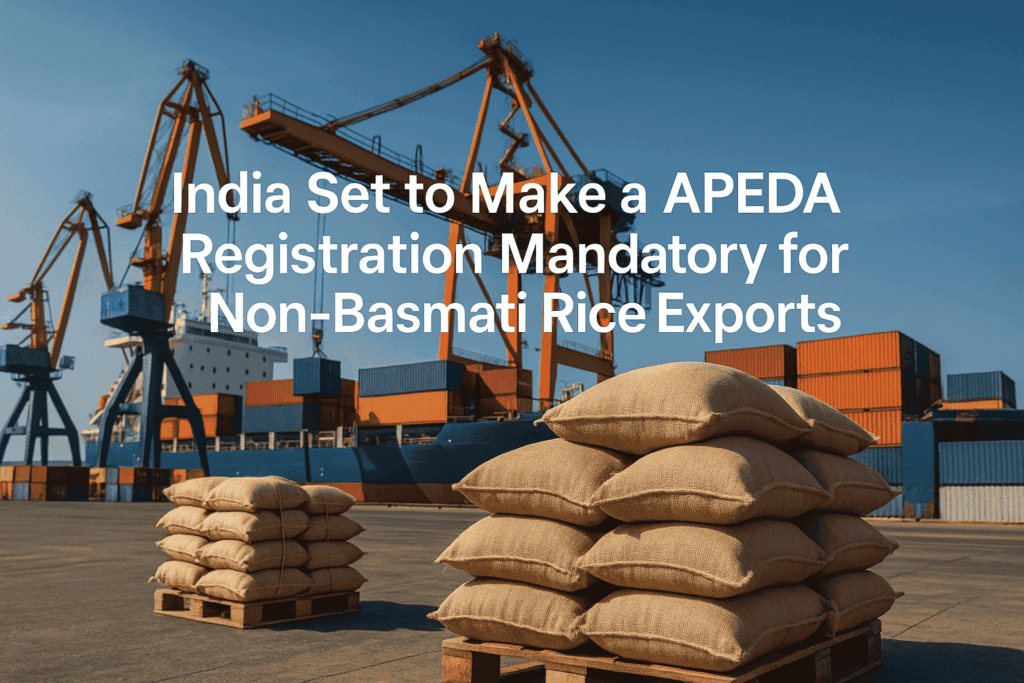
In a move aimed at streamlining rice exports and enhancing quality control, the Indian government is planning to make it compulsory for exporters of non-Basmati rice to register their contracts with the Agricultural and Processed Food Products Export Development Authority (APEDA). Furthermore, this would align the non-Basmati segment with the current system for Basmati rice exports.
According to sources familiar with the discussions, the government is also proposing a registration fee of ₹10–₹20 per tonne for non-Basmati rice shipments. The collected funds are expected to be used for promotional campaigns and to improve export infrastructure for Indian rice globally.
Why the Registration Move Matters?
Currently, Basmati rice exporters must register their export contracts with APEDA before shipments are cleared by Customs. Further, by extending this requirement to non-Basmati rice, the government seeks to:
- Ensure traceability and export monitoring
- Promote better compliance with international food safety norms
- Improve transparency in export data for non-Basmati varieties
With India being the world’s largest rice exporter, especially in parboiled and long grain varieties, the move is seen as a strategic step to further formalize and professionalize rice trade.
New Testing and Seed Processing Infrastructure Planned
To support the increasing demand for high-quality rice, the government also plans to strengthen testing and seed infrastructure:
- A second seed processing centre for Basmati rice is proposed in Pilibhit district, Uttar Pradesh.
- DNA testing labs for Basmati rice are planned in Karnal (Haryana) and Amritsar (Punjab) to help maintain the purity and authenticity of aromatic rice varieties.
Currently, only one such seed centre exists in Modipuram, Western UP. The increased registration fee from ₹30 to ₹50/tonne for Basmati rice will help fund this infrastructure.
Proposed Fee Structure for Exporters
| Rice Type | Existing Fee (₹/tonne) | Proposed Fee (₹/tonne) |
| Basmati | ₹30 | Up to ₹50 |
| Non-Basmati | None | ₹10–₹20 |
Commerce Minister Piyush Goyal recently held discussions with exporters, suggesting a hike in the Basmati registration fee to ₹100/tonne. However, after receiving feedback from exporters, the government may settle at ₹50/tonne.
Exporter Representation and Policy Updates
Responding to industry concerns over fund utilization, the minister has also agreed to induct representatives from both Basmati and non-Basmati rice sectors into APEDA’s board. This is expected to increase accountability and ensure that the funds serve the needs of exporters.
In addition, another important development is that the government has recently reclassified some Geographical Indication (GI) rice varieties, making it possible for non-Basmati rice exporters to take advantage of RoDTEP (Remission of Duties and Taxes on Exported Products).
Benefits of RCAC for Non-Basmati Rice
The planned introduction of the Registration cum Allocation Certificate (RCAC) for non-Basmati rice will:
- Help distinguish between common and specialty rice using the new Harmonised System (HS) codes
- Provide accurate export data for better policymaking
- Reduce rejection rates for exports to the EU and UK by ensuring APEDA registration and EIA certification where required
Final Thoughts
With these upcoming regulatory and infrastructural changes, India’s rice export ecosystem, especially for non-Basmati varieties, is poised for greater accountability, efficiency, and global competitiveness. Exporters should proactively prepare for these shifts by updating compliance procedures and aligning with APEDA’s registration requirements.
Moreover, as the government tightens quality controls and introduces new fees, stakeholders must also monitor how these changes could influence Indian rice prices in both domestic and international markets. Efficient registration and improved infrastructure may ultimately enhance India’s reputation as a reliable rice supplier worldwide.
At Shah Enterprises, we continue to support transparency and excellence in rice exports. Stay tuned for more updates as new policies are announced.
👉 Contact us today to streamline your rice export journey with expert guidance and premium quality assurance.

